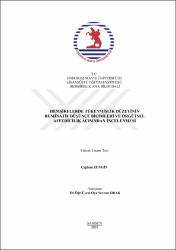Hemşirelerde tükenmişlik düzeyinin ruminatif düşünce biçimleri ve örgütsel affedicilik açısından incelenmesi
Citation
Zengin, Ç. (2021). Hemşirelerde tükenmişlik düzeyinin ruminatif düşünce biçimleri ve örgütsel affedicilik açısından incelenmesi . (Yüksek lisans tezi). Ondokuz Mayıs Üniversitesi, SamsunAbstract
Amaç: Bu araştırmanın amacı hemşirelerde tükenmişlik düzeyinin ruminatif
düşünce biçimleri ve örgütsel affedicilik açısından incelenmesidir.
Materyal ve Yöntem: İlişki arayan, tanımlayıcı tipte olan bu araştırma, bir
üniversite hastanesinde çalışan 255 hemşire ile yürütülmüştür. Veri toplama aracı
olarak “Tanıtıcı Bilgi Formu”, “Maslach Tükenmişlik Ölçeği”, “Ruminatif Düşünce
Biçimleri Ölçeği” ve “Örgütsel Affedicilik Ölçeği” kullanılmıştır. Verilerin
istatistiksel değerlendirilmesi SPSS 20.0 programı kullanılarak yapılmıştır. Verilerin
analizinde tanımlayıcı istatistikler (sayı, yüzde, ortalama, standart sapma),
Kolmogorov Smirnov testi, independent t testi, varyans analizi, pearson korelasyon
testi kullanılmıştır.
Bulgular: Analiz sonucunda hemşirelerin Maslach Tükenmişlik Ölçeği alt
boyutlarından aldıkları puanların ortalamaları Duygusal Tükenme 17,41±6,89;
Duyarsızlaşma 5,29±3,74; Kişisel Başarıda Düşme 11,48±4,43 olarak bulunmuştur.
Ayrıca hemşirelerin Ruminatif Düşünce Biçimleri Ölçeği puan ortalamalarının
71,84±20,67; Örgütsel Affedicilik Ölçeği puan ortalamasının ise 67,85±11,09 olduğu
saptanmıştır. Hemşirelerin Maslach Tükenmişlik Ölçeği alt boyutları olan duygusal
tükenme, duyarsızlaşma ve kişisel başarıda düşme puanları ile Ruminatif Düşünce
Biçimleri Ölçeği puanları arasında pozitif yönde; Örgütsel Affedicilik Ölçeği
puanları arasında ise negatif yönde anlamlı bir ilişki olduğu belirlenmiştir (p<0,05).
Sonuç: Hemşirelerde ruminatif düşünce arttıkça tükenmişlik düzeyinin arttığı;
örgütsel affedicilik düzeyi arttıkça, tükenmişlik düzeyinin azaldığı sonucuna
ulaşılmıştır Aim: The aim of this study is to examine the level of burnout in nurses in
terms of ruminative thinking styles and organizational forgiveness.
Material and Method: This descriptive, relationship-seeking study was
conducted with 255 nurses working in a university hospital. "Descriptive Information
Form", "Maslach Burnout Inventory-MBI ", "Ruminative Thought Style
Questionnaire" and "Organizational Forgiveness Scale" were used as data collection
tools. Statistical evaluation of the data was made using the SPSS 20.0 program.
Descriptive statistics (number, percentage, mean, standard deviation), Kolmogorov
Smirnov test, independent t test, analysis of variance and Pearson correlation test
were used in the analysis of the data.
Result: As a result of the analysis, the mean scores of the nurses' subdimensions of the Maslach Burnout Inventory were Emotional Exhaustion 17.41 ±
6.89; Desensitization 5.29 ± 3.74; Decrease in Personal Achievement was found to
be 11.48 ± 4.43. In addition, the mean score of the nurses' Ruminative Thought Style
Questionnaire was 71.84 ± 20.67; The mean score of the Organizational Forgiveness
Scale was found to be 67.85 ± 11.09. Between the scores of the nurses' emotional
exhaustion, depersonalization and personal accomplishment sub-dimensions of the
Maslach Burnout Inventory and the scores of the Ruminative Thought Style
Questionnaire, positively; It was determined that there is a significant negative
correlation between the scores of the Organizational Forgiveness Scale (p <0.05).
Conclusions: As ruminative thinking increases in nurses, the level of burnout
increases; It was concluded that as the level of organizational forgiveness increased,
the level of burnout decreased.
















